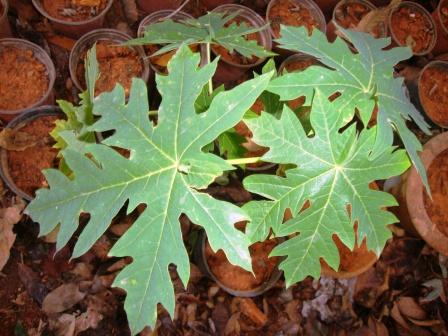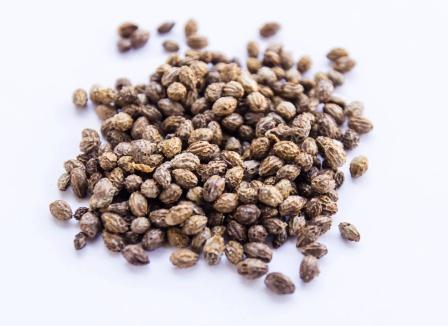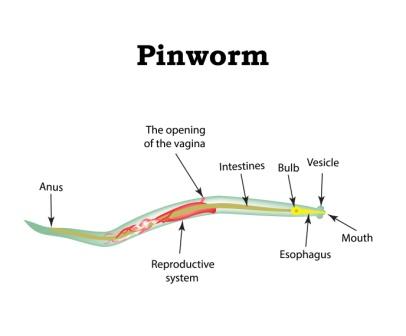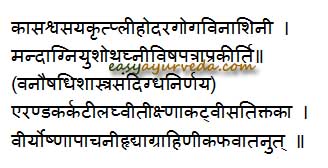Benefits of Papaya Fruit, Seeds, Leaves, Latex, Remedies, Side Effects
The leaves, latex (mix exudate), seed and fruits of Papaya are extensively used in the treatment of pain, bleeding piles, constipation, dysmenorrhea, poisonous bites of insects and skin diseases.
Botanical Name- Carica papaya Linn.
Family– Caricaceae

Table of Contents
Papaya Remedies
- The milk from the raw papaya is applied over mouth ulcer to treat it.
- The milk of the raw papaya is applied over insect bites, scorpion bitten area to relieve the pain.
- The cold infusion prepared from the leaves of papaya is given in a dose of 20-30 ml to treat local swelling, fever, difficulty during micturition.
- Dengue: Leaves of papaya are crushed in a clean mortar and pestle and juice is extracted. 15 – 30 ml of this juice is mixed with equal or double quantities of water and administered once or twice a day for the treatment of dengue.
- The ripened fruit of papaya is consumed to relieve constipation.
- The raw papaya is consumed as vegetable to treat intestinal worm, piles and hepatomegaly.
- The milk from raw papaya is applied over wounds and bleeding piles to treat it.
- The leaves of the papaya plant are slightly heated and applied locally over the part of the body to relieve pain and swelling.
- The milk of raw papaya is applied locally to relieve skin diseases like eczema, ringworm.
- The papaya fruit is consumed to strengthen the muscles of the heart.
- Papaya seeds are made into fine powder and administered in the dose of 5-6 grams daily, in the empty stomach.
Properties, part used, dosage
Papita medicinal Properties
Rasa (Taste) of leaf – Katu (Pungent),Tikta (Bitter)
Guna (Properties) –Laghu (Light for digestion), Ruksa (Dry), Tikshna (Pungent)
Vipaka- Katu (Undergoes to pungent taste conversion after digestion)
Veerya (Potency) – Ushna (Hot)
Karma- Kaphavatahara (pacifies Kapha and Vatadosha), Hridya( Benefits the heart)
Part used-Fruit, Leaf, Latex, Seed
Dosage-Leaf infusion 40-80 ml
Seed powder- 0.5- 1g
Latex- 3-6 g
The wild madhukarkati is sweet in taste, cold in potency, relieves burning sensation, mitigates all the three doshas, imparts good taste, is aphrodisiac,heavy and difficult to digest.
Papaya Seeds for Pinworm Infection
By Dr MS Krishnamurthy MD (Ayu), PhD (Ayu)
In children, pinworm is a common health complaint. Even few adults are also repeatedly get this complaint. Quite interestingly, the incidence remains in little higher range among the people who eat leafy vegetables excessively or regularly. Pinworm is commonly known as threadworm and seatworm.
Though wormicides like Mebendezole, Albandezole, Piperizine citrate etc are prescribed, they produce their effect only for certain period of life. After 15-20 days once again the same complaints like nausea, itching in the anus, discomfort during defecation, indigestion, mal-absorption etc are complained.
Here is a most effective, safe and cheaper home remedy for this kind of complaint.

Ingredients
Ingredients required:
Papaya seeds 2 fist full (50 grams)
Honey or jaggery
Preparation
Method:
Dried papaya seeds are taken and make into fine powder.

Method of administration
5 gram (3 gram in case of children of below 8 years of age) of powder is mixed with 1 teaspoon of honey and licked, early in the morning on empty stomach.
After 10 minutes,
1 pinch of table salt or Rock salt (1 gram) and 2 pinches of turmeric powder (1 – 2 grams) is added to a cup of warm water and is given to drink.
How long it should be practiced?
5-7 days regular medication helps to overcome the complaints of pin worms.

When to repeat?
If the complaint doesn’t persist, the medication may be repeated in between. Or else, after 1 month, same is repeated for 3 consecutive months.
There after once in 3 months if this is administered, surely it relives the problem of pin worms.
Health benefits
This acts as laxative, carminative, digestive, liver stimulant (cholegogue), wormicide, antipyretic etc. Also it improves the digestion and metabolism of the body.
We need to practice such simple and effective safe formulation in our practice. This is one of the easiest ways to remain away for chemical molecules for our simple illnesses.
Read related: Ayurvedic Treatment For Worm Infestation
What about other parasites?
The above one is specific for pinworms, as per the experience of Dr Krishnamurthy. If other parasites are involved, then medicines that are mentioned in the below article are useful.
Consult Dr MS Krishnamurthy MD (Ayu), PhD
Chemical composition
The green parts of the plant and seeds of the papaya contain an alkaloid carpaine. The seeds also contain carpasamine. The latex of the plant contains papain, chymopapain and pseudocarpaine. The ripened fruit of papaya contains vitamin A, thiamine, riboflavin, niyacin and vitamin C. The latex of the unripe fruit is collected by giving a cut and the collected latex is dried under shade.
papaya contains the digestive enzyme, papain. It is used in treating sports injuries, other causes of trauma, and allergies.
Being rich in Vitamin A, pro-vitamin A carotenoid phytonutrients and C, Papaya fruit is an excellent anti oxidant.
Sanskrit verse

– Dravya Guna Vijnana, PV Sharma.
Hrudya – cardiac tonic, good for heart
Grahi – absorbent, bowel binding, useful in IBS, diarrhoea
Karma: Appeases the burning sensation within the body and body parts; controls the fever. Controls the raktapittaM condition [bleeding diathesis].
Action on Dosh?s: Appeases the pitta and rakta doshAs.
Indications
Ayurvedic Indications:
Kasa – cold, cough
Shwasa – asthma, respiratory disorders involving difficulty in breathing
Yakrutodara – Liver enlargement, hepatomegaly
Pleehodara – splenomegaly, enlarged spleen
Mandagni – low digestion strength
Shotha – oedema, swelling, inflammatory conditions.
Visha – toxic conditions
How to consume Papaya?
Its fruits are consumed readily.
Fruits are added as an ingredient of fruit salad, along with banana, apple etc.
Fruits are sprinkled with black pepper powder for added taste.
Its fruit juice is prepared by adding few cardamoms.
Papaya for meat eaters:
For people who consume excess of proteins like meat or protein supplements, having a few slices of Papaya can help in easy digestion of proteins. It contains Papain, a phytochemical which acts as proteolytic. It helps in easy breaking down of protein molecules into smaller digestion friendly ones. (1)
Ayurvedic formulations
Formulations containing Erandakarkati:
Ashmariharakashaya: It is an ayurvedic medicine in decoction form given to treat conditions of urinary calculi and the pain arising due to it.
Alopazyme syrup: It is a proprietary Ayurvedic medicine manufactured by ALOPA HERBALS pharmaceuticals, Bhuvanagiri, Bangalore. It is used in the treatment of all types of digestive problems.
Caripill: It is a tablet manufactured by micro labs, Bangalore, to increase the platelet count in patients suffering from dengue fever.
Uplat capsules: It is a capsule to treat low platelet count in the body.
Interaction with medicines, supplements
Can this be used while taking Homeopathic medicine?
Yes. This product does not react with homeopathic medicine.
Can
this medicine be continued while taking supplements like multivitamin tablets,
Omega 3 fatty acids etc?
Yes. Generally, this product goes well with most
of the dietary supplements. However, if you are taking more than one product
per day, please consult your doctor for an opinion.
With western
medicines
Seek your
doctor’s advice if you are taking this product along with other western
(allopathic / modern) medicines. Some Ayurvedic herbs can interact with modern
medicine.
If both Ayurvedic and allopathic medicines are advised together, then it is
best to take Allopathic medicine first, wait for 30 minutes and then take the
Ayurvedic medicine.
Research, adverse effects
Research work on Caricapapaya:
Improves platelet count:The study was conducted to investigate the platelet increasing property of Carica papaya leaves juice (CPLJ) in patients with dengue fever (DF).There was a significant increase in mean platelet count observed in the intervention group but not in the control group 40 hours since the first dose of CPLJ. Comparison of mean platelet count between intervention and control group showed that mean platelet count in intervention group was significantly higher than control group after 40 and 48 hours of admission.
Anti- inflammatory activity: The anti-inflammatory activity of an ethanolic extract of Carica papaya leaves was investigated in rats using carrageenan induced paw oedema, cotton pellet granuloma and formaldehyde induced arthritis models. The results show that the extracts significantly (p <0.05) reduced paw oedema in the carrageenan test. Likewise the extract produced significant reduction in the amount of granuloma formed from 0.58 ±0.07 to 0.22 ±0.03 g. In the formaldehyde arthritis model, the extracts significantly reduced the persistent oedema from the 4th day to the 10th day of the investigation. The extracts also produced slight mucosal irritation at high doses. The study establishes the anti-inflammatory activity of Carica papaya leaves.
Potential medicinal benefits:The latex from unripe papaya fruit contain enzymes papain and chymopapain; other components include a mixture of cysteine endopeptidases, chitinases and an inhibitor of serine protease. Phytochemical analysis of C.papaya leaf extract revealed the presence of alkaloids, glycosides, flavanoids, saponins, tannins, phenols and steroids. This review focuses on different properties of papaya such as antioxidant and free radical scavenging activity, anticancer activity, anti-inflammatory activity, treatment for dengue fever, anti-diabetic activity, wound healing activity and anti- fertility effects.
Papaya Adverse effect: Pregnant women should not consume raw papaya as the milk present in the raw papaya may cause abortion. In the folklore practice, raw papaya is used to cause abortion.
Market available variants of papaya
Papayas, raw
बीजपूरोऽपरः प्रोक्तो मधुरो मधुकर्कटी |
मधुकर्कटिका स्वाद्वी रोचनी शीतलाः गुरुः |
रक्तपित्तक्षयश्वासकासहिक्काभ्रमापहा ||१०९|| (bhavaprakashanighantu Amradiphalavarga) Rasa – sweet
Guna – heavy
Veerya – cold
Vipaka – sweet
Effect on Doshas
Vata balancing
Pitta balancing
Kapha increasing
Papaya, canned, heavy syrup, drained
Rasa – sweet
Guna – very heavy
Veerya – cold
Vipaka – sweet
Effect on Doshas
Vata balancing
Pitta balancing
Kapha increasing (more Kapha increasing than fruit as heavy syrup is highly concentrated)
Papaya nectar, canned
Nectar has a thicker texture and isn’t as clear as pure juice.
Rasa – sweet
Guna – heavy
Veerya – cold
Vipaka – sweet
Effect on Doshas
Vata balancing
Pitta balancing
Kapha increasing (more Kapha increasing than fruit as nectar is slightly thick)
Vernacular names
Names in different languages:
Hindi name- Papita, andakharbuja, papaya, papeetha
English name- Papaya fruit, melon tree, papain, papaya, paw paw.
Bengali Name- Papeya
Kannada Name- Parangimara, akka thangi hannu, bappangaayi, papaya, peragi, parangi hannu mara, poppaya, Pappayi hannu
Telugu name- Boppayi, bapaipundoo, bappayi, boppayi,poppaya.
Marathi name – papaya, popai.
Tamil Name- Pappali, pappali phalam, parangi aamanakku, poppayi, cittamukkikamaram, kapakkini maram.
Malayalam name – apappaya pazham, kaplam, kappalam, karmmos, papaya pazham.
Urdu name – arand kharbuza.
Persian name – aanabahe-hindi.
Arabic name – aanabahe-hindi.
Sanskrit synonyms
Synonyms of Eranda Karkati:
Nalaparni- The stalk of leaves are cylindrical.
MadhuKarkati, Erandachirbhata
Scientific classification
Kingdom: Plantae
(unranked): Angiosperms
Order: Brassicales
Family: Caricaceae
Genus: Carica
Species: C. papaya
Papaya plant is a native of West Indies and Central America. It is now cultivated all over India in moderate climate. It is a small tree growing to a height of 4-6 m. The ripened papaya fruit is well known for its health benefits.
Author: Dr.B.K.Prashanth M.D (Ayu), Ph.D.
Consult Dr BK Prashanth











15 comments
Dr J V Hebbar MD(Ayu)Author
Thanks for value addition, Dr Makkar. 🙂
Dr.J.S.Makkar
Your are welcome Dr Hebbar
We are always be thankful to you for provided platform, where every mind nourishes with Knowledge of Creator’s(True Lord’s) Creation(Nature)
Hv a good day
Sagar Kulkarni
Does ripened papaya increase pitta?
Dr J V Hebbar MD(Ayu)Author
No, because of its sweet taste.
Kamchan
Very useful.
zubesky
Dr what is its guna and vipaka hot or cold? Okay to consume in hot summer?
Dr J V Hebbar MD(Ayu)Author
Papaya fruit has Madhura rasa – sweet taste and Ushna veerya.
It is not very hot and can be consumed during summer.
Bonita
What is Shwasa which is good for asthma, respiratory disorders & breathing and what is Shothe which is for oedema and swelling. I am with this problems.
Dr J V Hebbar MD(Ayu)Author
Shwasa means asthma / breathing difficulty.
Shotha means swelling / inflammation.
aman
Is thr any other classical formulation other than ashmarihar kshaya having papaya?
Dr J V Hebbar MD(Ayu)Author
Cannot think of any
Raj
Can papaya and banana be eaten by someone suffering from gastritis? Will they help with healing?
Dr J V Hebbar MD(Ayu)Author
Yes
Ranjith
Can Papaya Fruit eaten at night with foods
Dr J V Hebbar MD(Ayu)Author
Yes